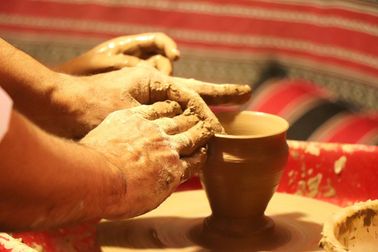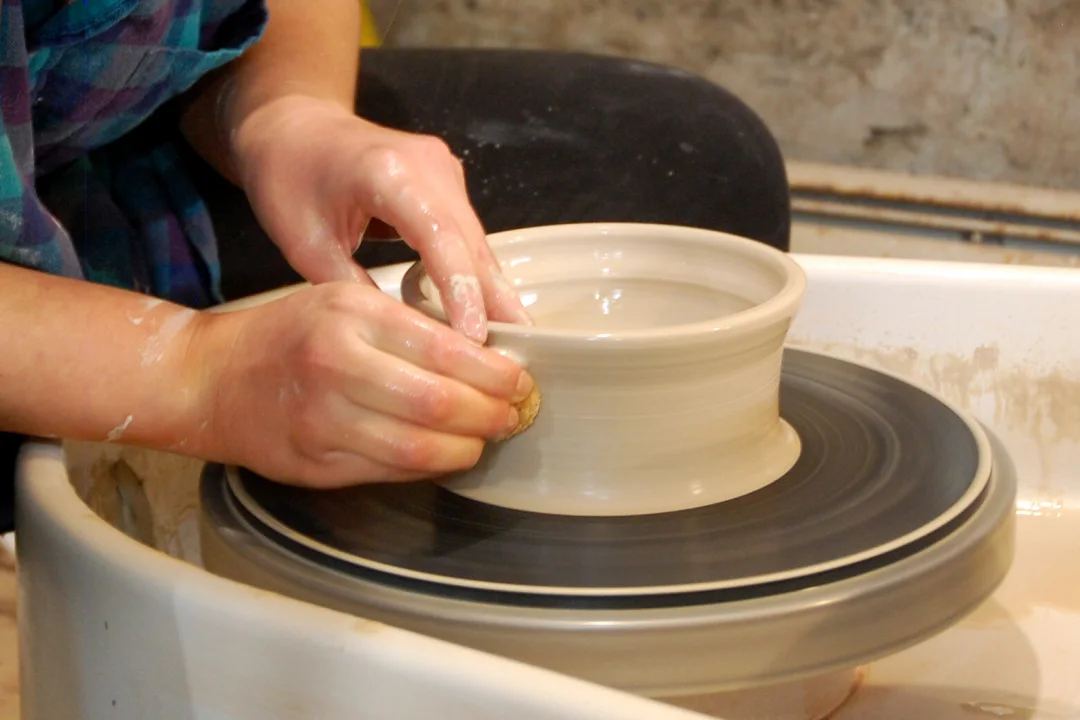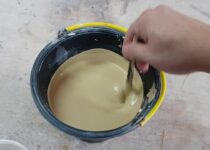Why Does Clay Smell Bad
Stinky clay and coating pails can be an issue in any fired studio. The odor comes from a muggy, lake clay smell to an exceptionally impressive sulfurous odor. All are brought about by a natural matter in your clay or coating of some sort.
The most ideal way to take out these odors is with something you likely now have around: copper carbonate.
Indeed, it’s just straightforward. A tad of copper can dispose of any smell, given the antimicrobial properties of the component. You could add a follow measure of copper to a pail of white coating without changing the variety. This post will cover how to manage stinky smells in underglaze compartments, coat pails, and recover stinky clay.
The smell isn’t something you fundamentally partner with clay since the vast majority of us ponder working it with our hands. However, did you have any idea that clay truly does have a smell, and in some cases that smell can be pretty off-put?

In this article, we’ll explain why clay smells how it does. This incorporates clay resembling it ought to as well as what it would possess an aroma like if it’s terrible. Clay has many intriguing properties to it that we’ll likewise examine, for example, how you can clean your clay to eliminate the terrible odor you could smell.
Is it true that you are prepared to look into why clay smells unpleasant? How about we begin?
For what reason Does My Clay Smell Horrible?
There are many motivations behind why your clay could smell unpleasant. These causes might be connected here and there, contingent upon what you have going on. It likewise relies upon what kind of clay you’re utilizing, like air-dry clay. These odors range as far in seriousness from not that terrible to incredibly upsetting.
Here are the absolute most normal justifications for why your clay could smell horrible.
New Clay and Natural Matter
Clay, as a rule, will smell horrible because there’s natural material blended in with the clay. Over the long haul, this natural matter can separate. The breaking down material might emit a stinky smell that isn’t unsafe in itself. It likewise doesn’t imply that the clay has turned sour. It’s simply a piece of working with clay overall.
Shape
Your clay can develop shape. More often than not, it’s either green shape or dark form, and it’s not great assuming you see either type.
You can eliminate the shape from your clay by removing it. Not withstanding, if the shape goes through the clay (i.e., it’s been sitting for quite a while), you might have to dispose of the clay out and out. Clay possibly turns sour assuming it starts to separate or gets sullied in some way.
Note that it’s anything but smart to integrate the shape into your work and figure that the furnace will fire it away. Regardless of whether the shape spores were to wreck in intensity, the pockets left by the form could cause a blast in your oven. if you want to know more about hand building with clay then read more here.

A Tight Seal
Clay can smell unpleasant normally, and that is something to be thankful for. A wide range of sorts of clay, contingent upon where they were obtained, could resemble various things. Individuals have portrayed the smell as muggy or sulfurous as it were. That is a typical smell for clay, particularly those obtained from clay.
Cleaning Arrangement
As we’ll examine in a later segment, you can clean clay with specific arrangements. The actual arrangements might provide the clay with somewhat of an odor even after it’s washed off. These arrangements incorporate dye and vinegar, both rather sharp odors for most noses.
Clay is Burnt
If you’re heating the polymer clay in the broiler and have allowed it to go for somewhat too lengthy, your nose will let you know something’s off-base. Polymer clay that is burnt won’t have a charming smell. Assuming that you truly do smell something consuming while baking this clay, it’s ideal to eliminate it from the stove before anything awful occurs.
What is the Odour of Clay?
Not all clays smell something similar. This is the thing you can expect the most widely recognized clay types to possess an odor like.
Air Dry Clay
There are many odors related to air-dry clay. For instance, each brand could smell a piece differently relying upon what fixings they use to plan their air-dry clay.
Many individuals believe air dry clay to be especially plastic-smelling, much the same as the pristine shower drape smell a significant number of us are utilized to. This plastic smell comes from the parts inside the air dry clay that give it pliancy as well as adaptability for demonstrating.
Certain brands of air-dry clay might smell more grounded than others. Once more, this is because of the elements of the air-dry clay itself, which fluctuates starting with one producer and then onto the next.
Polymer Clay
Polymer clay is something you might track down in any fired studio. This kind of clay has a more obscure colorant that gives it profundity as it fires. Since polymer clay doesn’t set up as it dries, and should be terminated to fix, it has higher water obstruction than air dry clay. That allows it to a lesser degree an opportunity of developing mold and transforming into rotten clay, as the shape doesn’t have the dampness component to lock on to.
Pottery Clay
We can separate ceramic clay into numerous classes, like pottery, stoneware, porcelain, and ball clay. These clays all have different qualities that direct the specific smell they might put off.
For instance, pottery and stoneware clays might smell worst since they come from materials regularly tracked down in the ground. Porcelain might have somewhat of an alternate smell since it fires at a higher temperature where natural materials are burnt off.
Ball clay is commonly alluded to as potter’s clay. Like porcelain, lighter-shaded clay has a gritty smell.
Precious Metal Clay (PMC)
As you might have speculated, precious metal clays ordinarily assume the smell of the metals inside the clay. You could get a metallic fragrance out of them that odors like a wet penny or different coins. These odors probably won’t be all around as solid as odors from different sorts of clay, yet they are available.
Numerous crafters utilize the liver of sulfur to oxidize precious metal clay. This specific substance radiates an extremely impressive sulfurous smell (subsequently the sulfur part). Precious metal clays that have been treated with liver sulfur might keep on smelling unpleasant even after the treatment is finished.

How Would You Get the Smell Out of Clay?
There are a couple of ways you can eliminate the smell from your clay. The majority of them are economical and don’t need a ton of devices.
Bleach
Cleaning mold and some other undesirable natural matter from your clay by utilizing bleach are conceivable. Just weaken about a quarter cup of bleach in a gallon of water and splash it outwardly of your clay.
After you let the clay sit for around 24 hours, you ought to see a distinction in smell. While you could smell more dye than anything more, this ought to disappear over the long haul. You can likewise wedge the clay to disseminate the detergent and ideally permit it to dissipate from the actual clay.
The dye shouldn’t disrupt terminating yet may influence any coatings that are applied before the bisque terminating. Be wary of this assuming you are anticipating utilizing procedures like sgraffito on your green ware.
Vinegar
Vinegar is another arrangement that leaves your clay stinky but perfect. You can add vinegar straightforwardly to your clay to clean it, yet it’s ideal to likewise allow it to sit for the time being and drench. Once more, the vinegar smell might require a significant period to scatter from the clay, yet it ought to be spotless in any case.
One advantage to utilizing vinegar to get the smell out of clay is that the clay turns out to be more plastic. This permits you to control it effortlessly, which can be inconceivably helpful for those who have relatively little hand strength.
Copper Carbonate
In all honesty, copper carbonate can clean your clay. This specific substance is powdered and seems to be a dark blue-green, similar to the Sculpture of Freedom. When added to clay, copper carbonate can improve things significantly concerning smell.
The critical element of copper carbonate is that it is antimicrobial. Any natural matter that is separating and causing a smell will be killed by the copper carbonate and, at times, the copper can keep further development from occurring too.

Being associated with art and craft field since decades as a hobbyist and life long learner has given me an opportunity to learn many new things related to art, craft, paints and pottery which i am trying to share with your guys on this website. I have expertise of being professional painter and potter for the last 20+ years
I have learned mind blowing cool tips and insights which makes me a person with ability to improvise and come up with creative ideas and solutions to make stunning and impeccable art pieces of all types which are adored by people across the globe on this website and other platform.


